Anaerobic Digestion and the Journey to Net Zero in the UK
As the UK sets ambitious targets to achieve net zero emissions, anaerobic digestion emerges as a crucial technology in the sustainable energy landscape. This blog post explores the role of anaerobic digestion in reducing greenhouse gas emissions, managing waste, and contributing to the UK's journey towards net zero.
Anaerobic Digestion: A Pillar in Achieving Net Zero
The role of anaerobic digestion in achieving net zero is multifaceted, addressing both waste management and renewable energy production.
Reducing Greenhouse Gas Emissions
Anaerobic digestion captures methane from organic waste, preventing it from entering the atmosphere and contributing to greenhouse gas emissions. This process is essential in the UK's strategy to reduce its carbon footprint and achieve net zero emissions.
Waste Management and Resource Utilisation
By converting organic waste into biogas and digestate, anaerobic digestion promotes a circular economy, reducing landfill usage and turning waste into valuable resources.
Anaerobic Digestion in the UK's Renewable Energy Strategy
Anaerobic digestion plays a significant role in the UK's renewable energy strategy, contributing to energy diversity and security.
Integration in the Energy Mix
Anaerobic digestion plants across the UK process various organic wastes, contributing to the nation's renewable energy mix and enhancing energy security.
Policy Support and Investment
The UK government recognises the importance of anaerobic digestion, providing support through policies and incentives. This support is crucial for the development and adoption of anaerobic digestion technology.
Challenges and Opportunities
While anaerobic digestion offers numerous benefits, it also faces challenges that need to be addressed to maximise its potential in the journey to net zero.
Future Prospects and Innovations
Ongoing research and technological advancements are enhancing the efficiency and applicability of anaerobic digestion. These developments promise to address existing challenges and open new opportunities for this technology in achieving net zero.
Conclusion
Anaerobic digestion stands as a crucial technology in the UK's journey towards net zero. By transforming organic waste into renewable energy and promoting sustainable waste management, anaerobic digestion contributes significantly to reducing greenhouse gas emissions and advancing the UK's sustainability goals. Embracing and optimising anaerobic digestion is key to a sustainable, zero-waste, and energy-secure future.
